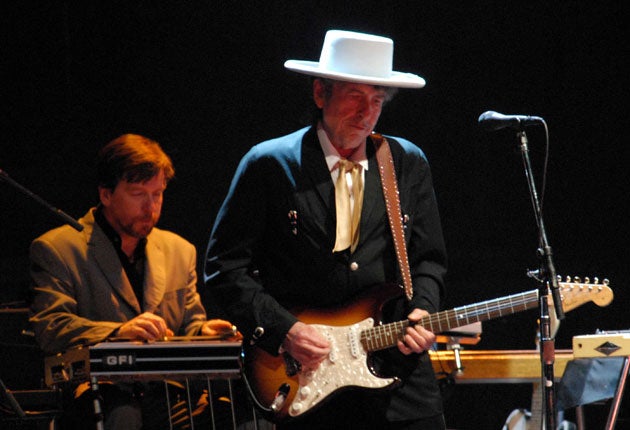Bob Dylan, O2 Arena, London
Dylan's times ain't a-changin'

With most big arena and stadium acts, it's abundantly evident from the off where your ticket money's gone: the likes of U2, Elton and the Stones flaunt their egos through giant stage sets replete with cantilevered walkways, cherry-picker cranes, mobile sub-stages, thunderous pyrotechnics and huge screens showing expensive home movies in between the magnified excerpts of what's actually happening on the stage. But not Bob Dylan. There are no fireworks, no choreographed stage manoeuvres, and no big screens at the O2 tonight; if you're a punter at the other end of the arena, all you can see is a small group of chaps wearing hats several hundred metres away.
To make matters worse, the chaps are clustered in a tight knot, seeking some degree of onstage intimacy in the vastness of the Dome. For a while, you might struggle to discern which of them is Bob Dylan himself, before realising he's the one on the far right behind the tiny electric organ, nattily attired in white jacket, dark trousers with the white stripe down the side, and what appears to be a white boater, as if ready for Henley, but on closer examination turns out to be a snazzy white Hickock hat. You can tell he's Bob because the rest of his band – the two guitarists, bassist, drummer, and the pedal steel guitarist just behind him – are all facing him, like spokes on an elliptical wheel.
The lack of showiness is Dylan's way of signalling that he knows what's important about himself, and what we're here to hear: it's not to be awed by stunts; it's to commune once again with that legacy which illuminates our times so well. And which we're immersed in, right from the start, courtesy of a swinging, bluesy take on "Maggie's Farm", and a heavily-accented waltz-time treatment of "The Times they are a-Changin'", on which Bob's hoarse, raw-throated vocal adds extra bite to the song's injunctions to not criticise what you can't understand, and get out of the new road if you can't lend your hand. It's followed, in typically wry manner, by its sly, polar opposite, "Things Have Changed", Dylan's offhand, disinterested delivery casually throwing away the kinds of lines lesser talents would kill for. As throughout the set, there's a smart clip to the beat, while the fiddle's descending melody emphasises the song's fatalistic tone. Something similar happens with "The Lonesome Death of Hattie Carroll", another waltz-time transposition with a fatalistic tone – though Dylan's characteristic throwaway delivery rather underplays the pay-off line about the killer's paltry six-month sentence.
There's nothing from the new album – Dylan still resolutely refusing to give bootleggers a head start on his new material, even though it's out on Monday – but plenty from the splendid Modern Times, including taut, whip-smart versions of "Rollin' and Tumblin'" and "The Levee's Gonna Break", an intimate, conversational "Workingman's Blues #2", and suitably relaxed cruises through "Thunder on the Mountain", "When the Deal Goes Down" and the balmy "Spirit on the Water". Of the other relatively recent songs, the most striking is a version of "'Til I Fell in Love with You" for which Bob comes out from behind the organ to throw a few languid shapes while essaying blues harmonica licks, like a supper-club cabaret singer.
The more recent material is interspersed with the usual sprinkling of old classics. The organ adds a dark undertow to a tragic "Ballad of Hollis Brown" nudged along by a persistent rhythm guitar motif, and the entire stage end of the arena is spattered with smudges of light to represent the "Chimes of Freedom" flashing. I'm not sure about Bob's organ break in "Highway 61 Revisited" – basically, he follows his patented lead guitar style, locating a counterpoint phrase and repeating it until it becomes almost the dominant melodic motif – but the standard set-closer/encore combination of "Like a Rolling Stone" and "All Along the Watchtower" works its usual magic, before the show closes with yet another re-casting of "Blowin' in the Wind", this time as a sort of slouchy soul-blues, reminiscent of "Backfield In Motion", which works rather better on stage than it sounds on paper.
Join our commenting forum
Join thought-provoking conversations, follow other Independent readers and see their replies
Comments
Bookmark popover
Removed from bookmarks